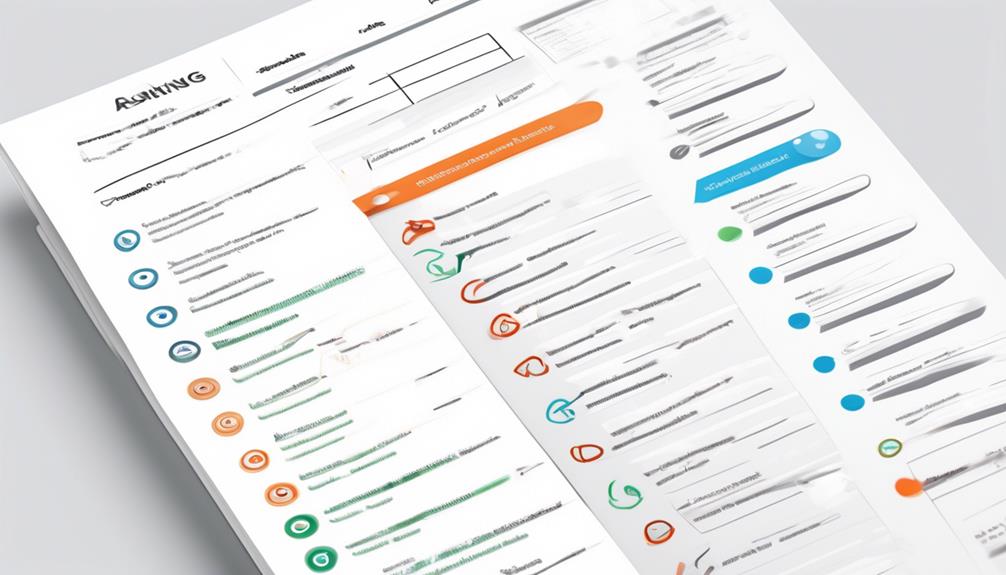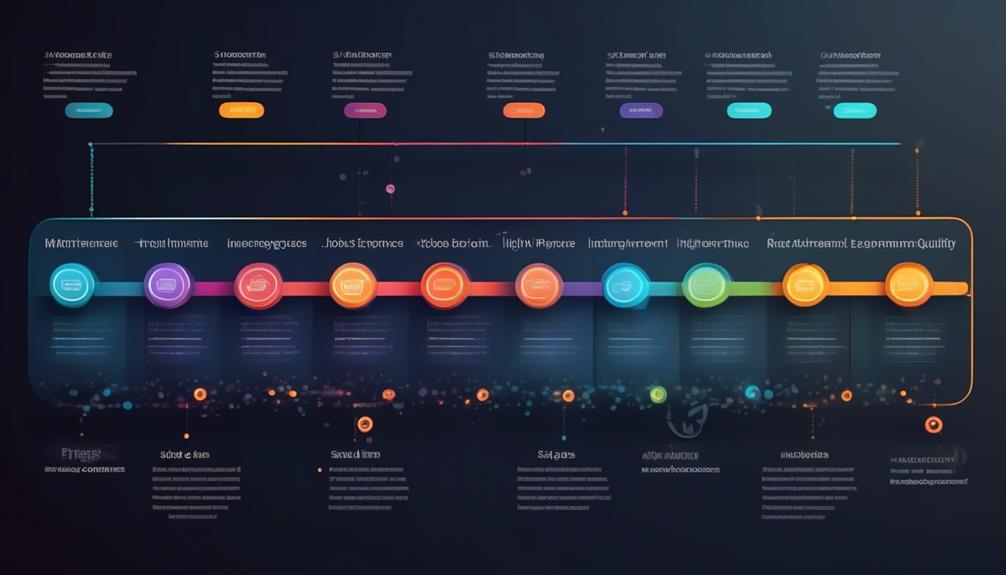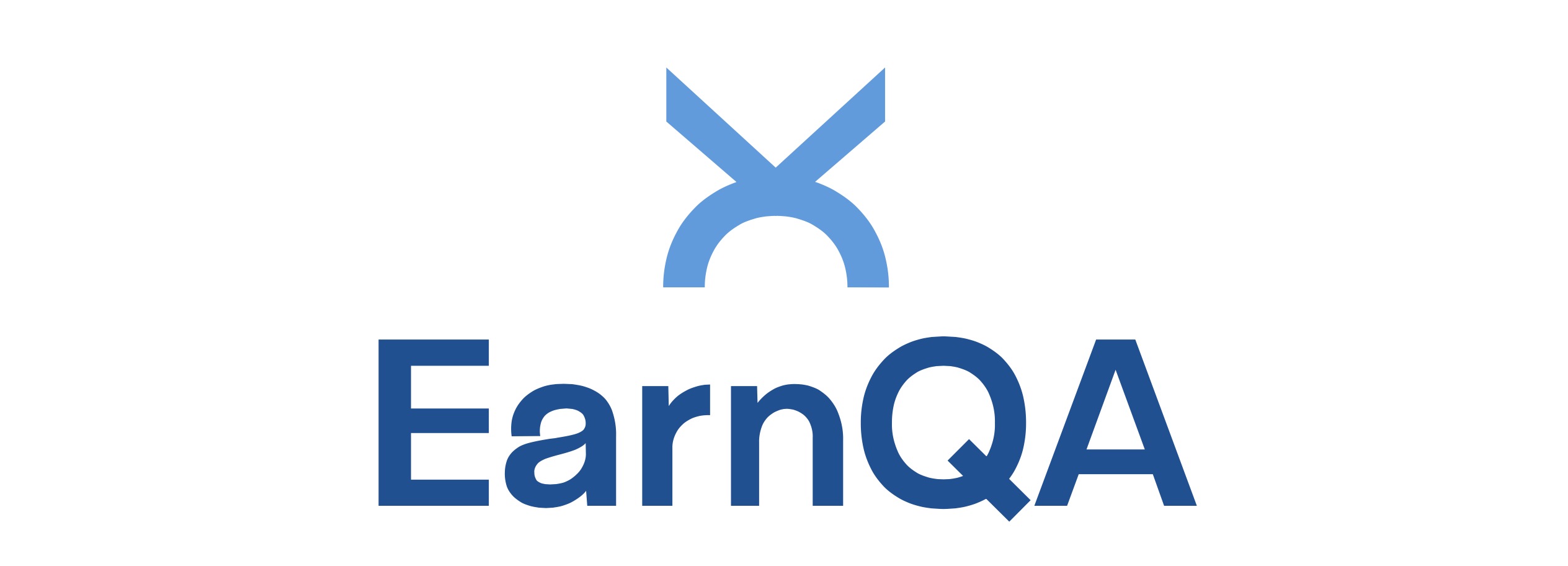Resources and Training
Elevate Quality with International Standards in SQA

In today’s competitive software development industry, it is essential for companies to prioritize developing top-notch software in order to stay ahead. Businesses rely on Software Quality Assurance (SQA) techniques and tools that follow global standards to achieve and sustain the desired levels of software quality.
SQA involves a proactive and systematic approach to prevent defects and ensure that software meets the desired quality standards. By implementing SQA frameworks and methodologies, organizations can improve the development process, enhance customer satisfaction, and minimize risks.
ISO standards play a vital role in SQA, providing organizations with the necessary guidelines and benchmarks to evaluate and enhance their software quality. ISO standards in SQA cover various aspects, including documentation, testing, process improvement, and compliance with industry best practices.
Key Takeaways:
- Software Quality Assurance (SQA) is a proactive approach to prevent defects and improve software quality.
- International standards in SQA, such as ISO standards, provide guidelines and benchmarks for evaluating and enhancing software quality.
- Implementing SQA frameworks and methodologies helps organizations deliver high-quality software and minimize risks.
- SQA involves documentation, testing, process improvement, and compliance with industry best practices.
- Adhering to international standards elevates software quality and enhances customer satisfaction.
What is Software Quality Assurance (SQA)?
Software Quality Assurance (SQA) is our proactive and systematic approach to preventing defects and ensuring that software meets the desired quality standards. We employ a set of tasks and processes performed throughout the software development lifecycle to identify and address potential quality issues. Our primary goal is to improve the development process and deliver high-quality software that meets user requirements and expectations.
SQA involves the implementation of various frameworks and methodologies to achieve these objectives. By adhering to software quality management principles, we prioritize quality at every stage of development, resulting in superior software products.
Our SQA practices encompass a comprehensive range of activities, including requirements analysis, design review, code inspection, unit testing, system testing, integration testing, and performance testing. By integrating these tasks into our development processes, we ensure that the software we deliver is reliable, robust, and meets our clients’ expectations.
“Software Quality Assurance is not just about finding bugs; it is about preventing them from ever happening.
Software Quality Assurance Frameworks and Methodologies
We follow industry-standard frameworks and methodologies to ensure effective SQA implementation. These frameworks provide a structured approach to software development and quality management, enabling us to consistently deliver high-quality software.
- Waterfall Model: A sequential development model that emphasizes documentation and rigorous planning.
- Agile Methodology: An iterative and collaborative approach that promotes flexibility, rapid development, and early delivery of working software.
- DevOps: A combination of development and operations, emphasizing collaboration, automation, and continuous integration and deployment.
- Six Sigma: A data-driven approach that focuses on reducing defects and improving process efficiency.
- Lean Development: A methodology that aims to eliminate waste, improve productivity, and deliver value to customers.
By leveraging these industry-standard frameworks, we ensure that our SQA practices align with global software quality assurance standards. This allows us to deliver software that not only meets our clients’ specific requirements but also adheres to international quality assurance guidelines.
Software Quality Assurance SQA Frameworks and Methodologies Software quality assurance is a proactive and systematic approach to preventing defects. The framework and methodologies we employ include the Waterfall Model, Agile Methodology, DevOps, Six Sigma, and Lean Development. It involves a set of tasks and processes performed throughout the software development lifecycle. By leveraging these frameworks, we ensure that our SQA practices align with global software quality assurance standards. Our primary goal is to improve the development process and deliver high-quality software. These frameworks enable us to consistently deliver high-quality software that meets user requirements and expectations.
What is a Software Audit?
Software audits play a vital role in ensuring quality control in software development, compliance with SQA standards, and obtaining SQA certifications. These audits involve a thorough retrospective assessment of software projects, processes, or products. Led by an independent software audit team, these examinations carefully scrutinize software artifacts, documentation, and development practices to identify areas of improvement, assess compliance with industry standards and regulations, and ensure adherence to best practices. The ultimate goal of software audits is to ensure compliance, identify weaknesses and risks, and provide valuable recommendations for improvement.
Software audits are an essential component of comprehensive quality control in software development. By conducting rigorous assessments, organizations can create a culture of continuous improvement and maintain a high level of quality in their software products. Additionally, compliance with SQA standards and obtaining relevant certifications not only demonstrates a commitment to industry best practices but also enhances the organization’s reputation and instills confidence in stakeholders.
Having a robust software audit process allows organizations to identify and rectify any deficiencies in their software development practices. By ensuring compliance with SQA standards and certifications, organizations can mitigate risks, enhance their software quality, and optimize their development processes. The insights gained from software audits enable organizations to make data-driven decisions to improve their software quality assurance initiatives.
Software audits are an integral part of effective quality control in software development. By conducting comprehensive assessments, we can identify areas for improvement, ensure compliance with SQA standards, and obtain valuable certifications. These audits help us enhance our software quality and maintain a high level of integrity in our development processes.”
Key Components and Scope of a Software Quality Audit
In order to ensure software quality and compliance with industry standards, a comprehensive software quality audit evaluates various components of the software development process. These audits are essential to identify areas for improvement and assess adherence to software quality assurance (SQA) standards.
During a software quality audit, several key components are assessed:
- Documentation Review: The audit examines the documentation associated with the software development process. This includes requirements documentation, design specifications, test plans, and user manuals. A thorough examination of the documentation ensures that it is accurate, complete, and in compliance with SQA industry standards.
- Code Review: The audit evaluates the quality and integrity of the software code. It assesses the coding standards, readability, modularity, and adherence to best practices. Code reviews help identify potential coding errors, vulnerabilities, and areas for optimization.
- Testing Evaluation: The audit assesses the testing strategy and execution to verify that comprehensive testing has been conducted. It evaluates the test plans, test cases, and test coverage to ensure that all functional and non-functional requirements have been adequately tested.
- Process Review: The audit examines the software development processes and methodologies in place. It assesses the efficiency and effectiveness of the processes, identifies bottlenecks, and recommends process improvements. This component ensures that the development processes align with global SQA standards and best practices.
- Security Assessment: Security is a critical aspect of software quality. The audit evaluates the security measures and protocols implemented in the software development process. It identifies potential security vulnerabilities, assesses the effectiveness of the security controls, and recommends enhancements to safeguard against threats.
- Performance Analysis: The audit examines the performance characteristics of the software, including response times, scalability, and resource utilization. It assesses the software’s performance against defined benchmarks or industry standards. Performance analysis helps identify performance bottlenecks and areas for optimization.
- Compliance Assessment: Compliance with industry standards and regulations is essential for software products. The audit assesses the software’s compliance with global SQA standards, such as ISO standards, and industry-specific regulations. Compliance assessment ensures that the software meets the required quality standards and regulatory requirements.
By evaluating these key components, a software quality audit provides organizations with a comprehensive assessment of software quality and adherence to SQA industry standards. This enables them to identify areas for improvement, enhance software quality processes, and ensure compliance with global SQA standards.
Benefits of Software Quality Audits
Software quality audits offer a multitude of benefits that help organizations enhance their software development processes and deliver high-quality solutions. These audits ensure adherence to international quality assurance guidelines, provide assurance of compliance with standards, and mitigate risks throughout the development lifecycle.
One of the primary advantages of software quality audits is the identification and remediation of deficiencies. By thoroughly examining software products, processes, and methodologies, audits reveal areas for improvement and enable organizations to address them effectively. This leads to the optimization and efficiency of development processes, enhancing overall software quality.
Moreover, software quality audits instill confidence in stakeholders, including clients, investors, and end-users. By conducting audits that follow best practices for software quality, organizations demonstrate their commitment to delivering reliable and secure software solutions. This, in turn, fosters trust and credibility, enhancing long-term business relationships.
“Software quality audits ensure compliance with global software quality assurance frameworks and international quality assurance guidelines.”
In addition to compliance with standards, software quality audits play a crucial role in risk mitigation. By thoroughly evaluating the development process, audits identify potential risks and vulnerabilities, allowing organizations to proactively address them. This proactive approach minimizes the likelihood of quality issues and reduces the potential impact of risks on project timelines, budgets, and overall software quality.
Furthermore, software quality audits facilitate process optimization and efficiency. By analyzing the entire software development lifecycle, audits identify bottlenecks, inefficiencies, and areas where process improvements are needed. This optimization ensures streamlined workflows, reduces waste, and enhances the overall efficiency of software development operations.
The Benefits of Software Quality Audits at a Glance:
- Identification and remediation of deficiencies
- Assurance of compliance with global software quality standards
- Mitigation of risks throughout the development lifecycle
- Process optimization and efficiency

In summary, software quality audits offer comprehensive assurance of compliance with international standards, while also enhancing development practices and mitigating risks. By optimizing processes and improving efficiency, organizations can deliver high-quality software solutions that meet the expectations of stakeholders and end-users alike.
How to Implement Software Quality Assurance
Implementing software quality assurance involves several key steps to ensure the successful integration of quality standards and practices into the software development process.
Quality Planning
In the first step, quality planning, we define the desired quality standards for the software project. This includes outlining the specific quality requirements, objectives, and metrics that will be used to assess the software’s performance and effectiveness.
Stakeholder Involvement
We believe that involving stakeholders throughout the software development process is crucial for effective quality assurance. By engaging stakeholders, such as customers, end-users, and quality assurance experts, we can gather valuable insights and perspectives that help shape the quality goals and ensure their alignment with user expectations.
Risk-Based Approach
A risk-based approach is vital in identifying potential risks and prioritizing quality assurance efforts. By conducting risk assessments and analyzing potential threats to the software’s performance and security, we can allocate resources and focus on the areas that pose the greatest risk to quality.
Continuous Improvement
Continuous improvement is at the core of software quality assurance. We believe in an iterative approach that involves regular reviews, evaluations, and feedback to identify areas for improvement and implement corrective actions. By continuously refining our processes and practices, we can enhance software quality and drive efficiency in the development lifecycle.
“Continuous improvement is not about the things we do well – that’s work. Continuous improvement is about the things we do badly – that’s evaluation.” – Dr. Goddard
Through effective quality planning, stakeholder involvement, a risk-based approach, and a commitment to continuous improvement, organizations can optimize their software quality assurance efforts and deliver high-quality software that meets user expectations.
Take a look at the table below for a visual representation of the steps involved in implementing software quality assurance:
Steps Details 1. Quality Planning Define quality standards, requirements, and metrics. 2. Stakeholder Involvement Engage stakeholders to gather insights and align quality goals. 3. Risk-Based Approach Identify and prioritize potential risks to focus quality efforts. 4. Continuous Improvement Regularly review, evaluate, and refine processes for better quality.
The Principles of Software Quality Assurance
Software quality assurance is driven by a set of principles aimed at ensuring the efficient implementation of SQA and the achievement of high-quality standards. These principles encompass defect prevention, continuous improvement, stakeholder involvement, and a risk-based approach.
Defect Prevention: We prioritize identifying and addressing potential defects early in the software development lifecycle. By implementing robust quality control measures and promoting a culture of vigilance, we aim to minimize the occurrence of defects and their impact on the final product.
Continuous Improvement: Our commitment to continuous improvement drives us to regularly assess and refine our SQA processes. We actively seek feedback, monitor performance metrics, and implement corrective actions to enhance our overall quality standards continually.
Stakeholder Involvement: We recognize the invaluable contributions of all stakeholders in the software development process. Engaging stakeholders throughout the SQA journey enables us to gather diverse perspectives, align goals, and build consensus on quality requirements, resulting in a product that satisfies all stakeholders’ expectations.
Risk-Based Approach: Our SQA practices are rooted in a risk-based approach that enables us to allocate resources effectively and prioritize testing efforts. By identifying and assessing potential risks, we can focus our attention on critical areas, mitigating risks, and enhancing the overall quality of our software.
By adhering to these principles, we empower our teams to implement software quality assurance effectively, delivering high-quality products that meet and exceed the expectations of our stakeholders.
Principles of Software Quality Assurance Defect Prevention Continuous Improvement Stakeholder Involvement Risk-Based Approach
Different Software Quality Assurance Approaches
When it comes to software quality assurance, there are various approaches organizations can take based on their project requirements. Each approach has its own characteristics and methodologies that contribute to achieving high-quality software. Let’s take a closer look at some of the most prominent approaches:
Traditional Approach
The traditional approach to software quality assurance follows a sequential and structured process. It involves detailed planning, requirements gathering, design, development, testing, and deployment. This approach is best suited for projects with fixed requirements and a stable development environment.
Agile Approach
The agile approach emphasizes flexibility, collaboration, and iterative development. It promotes continuous feedback and adaptation, enabling teams to deliver working software in short iterations. Agile methodologies, such as Scrum and Kanban, prioritize customer satisfaction and respond quickly to changing requirements.
DevOps Approach
The DevOps approach focuses on bridging the gap between development and operations teams. It emphasizes automation, collaboration, and continuous integration and continuous deployment (CI/CD). DevOps ensures rapid software delivery, improved quality, and faster time to market through close collaboration and shared responsibilities between teams.
Six Sigma Approach
The Six Sigma approach aims to minimize defects and variations in software development processes. It utilizes statistical analysis and problem-solving techniques to reduce process variations and improve quality. Six Sigma methodologies, such as DMAIC (Define, Measure, Analyze, Improve, Control), help organizations achieve operational excellence and deliver high-quality software consistently.
Lean Approach
The lean approach focuses on reducing waste, improving efficiency, and delivering value to customers. It emphasizes the elimination of non-value-added activities and continuous improvement. Lean methodologies, such as Lean Six Sigma and Lean Software Development, aim to optimize processes and maximize customer satisfaction.
Continuous Integration and Continuous Deployment (CI/CD) Approach
The CI/CD approach revolves around frequently integrating code changes into a shared repository and continuously deploying the software in a production environment. It ensures that developers’ code changes are automatically tested and deployed, reducing the risk of integration issues and enabling rapid delivery.
Test-Driven Development (TDD) Approach
The TDD approach emphasizes writing tests before writing the actual code. It follows a red-green-refactor cycle, where developers write failing tests, implement the code to make the tests pass, and then refactor the code to improve its design and maintainability. TDD ensures code functionality and provides a safety net for making changes without introducing defects.
Each software quality assurance approach offers its own set of benefits and advantages depending on the project requirements. By understanding the characteristics and methodologies of these approaches, organizations can choose the most suitable approach to ensure the delivery of high-quality software.

Automated Test Case Generation
Automated test case generation, using machine learning algorithms, revolutionizes the way we approach software testing. By harnessing the power of AI, we are able to efficiently create comprehensive test cases that provide broader coverage. This enables us to uncover potential issues and vulnerabilities, ensuring a higher level of software quality.
With automated test case generation, we can expedite the testing process and reduce the likelihood of undetected bugs slipping into production. By leveraging machine learning algorithms, we are able to analyze and understand the complexities of the software, identifying critical areas that require thorough testing.
By automating the test case generation process, we eliminate the need for manual test case creation, saving time and resources. Our AI-powered system intelligently generates test scenarios that cover diverse paths and edge cases, ensuring comprehensive testing coverage.
The result is a robust and reliable testing framework that provides a solid foundation to validate the software’s functionality, performance, and security.
Automated test case generation is a game-changer in the software development lifecycle, empowering us to deliver high-quality software with confidence. With its ability to create comprehensive test cases and provide broader test coverage, this innovative approach has become a vital component in our pursuit of excellence in software quality assurance.
Dynamic Test Scenario Adaptation
At GenAI, we understand the adaptive nature of dynamic test scenario adaptation in software testing. As code evolves and changes over time, it’s crucial to ensure that our test cases remain relevant and effective. Our advanced technology automatically adjusts the test scenarios based on these evolving code changes, allowing for comprehensive and efficient test coverage.
With dynamic test scenario adaptation, we address the challenges posed by rapid development cycles. By adapting our test cases to align with the evolving code changes, we can effectively test the functionality and stability of the software. This adaptive approach saves time and resources while maximizing the effectiveness of our testing efforts.
By embracing dynamic test scenario adaptation, we can confidently navigate the ever-changing landscape of software development. Our commitment to staying at the forefront of technological advancements ensures that our testing processes remain efficient and effective, even as software requirements and development methodologies continue to evolve.
Through continuous learning and optimization, our adaptive approach to test scenario adaptation enables us to provide comprehensive and accurate testing results, ensuring the highest quality software for our clients.
Predictive Defect Analysis
At GenAI, we leverage the power of predictive defect analysis to enhance your software testing efforts. By utilizing historical data and machine learning models, we can identify potential areas of concern within your codebase before they become critical issues.
This advanced technique allows our QA teams to prioritize testing efforts effectively, allocating resources where they are needed the most. By focusing on these high-risk areas, we can ensure more targeted and efficient testing, saving time and effort while maintaining the highest level of quality assurance.
Implementing predictive defect analysis not only improves the accuracy and effectiveness of testing but also enables us to preemptively address potential defects, minimizing the impact on your software development process. With this proactive approach, you can have confidence in the reliability and performance of your software, ultimately contributing to a better user experience.
Conclusion
GenAI is revolutionizing software quality assurance with its cutting-edge artificial intelligence capabilities. Through the use of advanced algorithms and machine learning models, GenAI automates and optimizes crucial testing processes, resulting in elevated software quality.
One of the standout features of GenAI is its automated test case generation. By leveraging AI, comprehensive test cases are created, ensuring broader test coverage and minimizing the likelihood of undetected bugs slipping through.
In addition, GenAI’s dynamic test scenario adaptation allows for seamless adjustments to test cases, accommodating evolving code changes. This adaptive nature guarantees that test coverage remains comprehensive and efficient, even in fast-paced development cycles.
Furthermore, with predictive defect analysis powered by machine learning models, GenAI enables quality assurance teams to prioritize their testing efforts effectively. By identifying potential areas of concern within the codebase, QA teams can allocate resources strategically, resulting in a more targeted and efficient testing strategy.
Software Quality Assurance (SQA) is a proactive and systematic approach to preventing defects and ensuring that software meets the desired quality standards. It involves tasks and processes performed throughout the software development lifecycle to identify and address potential quality issues, improve the development process, and deliver high-quality software that meets user requirements and expectations.
A software audit is an independent and systematic examination of software artifacts, documentation, and development practices to identify areas of improvement, assess compliance with standards and regulations, and ensure adherence to best practices. It helps organizations improve software quality, mitigate risks, and optimize development processes and efficiency. A software quality audit evaluates various aspects of software development, including documentation review, code review, testing evaluation, process review, security assessment, performance analysis, and compliance assessment. These components ensure a comprehensive evaluation of software quality and adherence to industry standards and best practices.
Software quality audits have significant benefits, including the identification and remediation of deficiencies, assurance of compliance with standards, mitigation of risks, and process optimization and efficiency. Audits help organizations improve software quality, instill confidence in stakeholders, and enhance overall development standards.
Implementing software quality assurance involves defining quality standards, planning SQA activities, conducting reviews, performing testing, monitoring and measuring, and continuously improving the SQA process. It requires clear objectives, collaboration among stakeholders, and a focus on risk management and improvement.
The principles of software quality assurance include defect prevention, continuous improvement, stakeholder involvement, and a risk-based approach. These principles ensure the efficient implementation of SQA and the achievement of high-quality standards.
There are different approaches to software quality assurance, including traditional, agile, DevOps, six sigma, lean, continuous integration and continuous deployment (CI/CD), and test-driven development (TDD) approaches. Each approach has its own characteristics and is suitable for different project requirements. Automated test case generation, using machine learning algorithms, enables the creation of comprehensive test cases with broader coverage. It expedites the testing process and reduces the likelihood of undetected bugs slipping into production.
GenAI’s adaptive nature allows for dynamic test scenario adaptation, automatically adjusting test cases based on evolving code changes. This ensures test coverage remains comprehensive and efficient, even with rapid development cycles.
GenAI utilizes historical data and machine learning models to predict potential areas of concern within the codebase. This enables QA teams to prioritize testing efforts and allocate resources effectively, contributing to a more targeted and effective testing strategy.
GenAI represents a game-changer in software quality assurance, leveraging artificial intelligence to automate and optimize testing processes. Its advanced capabilities, including automated test case generation, dynamic test scenario adaptation, predictive defect analysis, and performance testing optimization, elevate software quality to new heights.
FAQ
What is software quality assurance (SQA)?
What is a software audit?
What does a software quality audit evaluate?
What benefits do software quality audits provide?
How can software quality assurance be implemented?
What are the principles of software quality assurance?
What are the different software quality assurance approaches?
How does automated test case generation improve software quality?
How does dynamic test scenario adaptation enhance software quality?
What is predictive defect analysis?
What are the main benefits of using GenAI in software quality assurance?
At the helm of our content team is Amelia, our esteemed Editor-in-Chief. Her extensive background in technical writing is matched by her deep-seated passion for technology. Amelia has a remarkable ability to distill complex technical concepts into content that is not only clear and engaging but also easily accessible to a wide range of audiences. Her commitment to maintaining high-quality standards and her keen understanding of what our audience seeks are what make her an invaluable leader at EarnQA. Under Amelia’s stewardship, our content does more than just educate; it inspires and sets new benchmarks in the realm of QA education.
Resources and Training
Requirements for Software Quality Assurance Jobs
Standard requirements for software quality assurance jobs include knowledge of testing methodologies, experience with QA tools, attention to detail, and strong communication skills. Learn more about SQA job requirements here.

Hence, it is crucial to acknowledge the changing technological environment and the rising expectations for high-quality products when determining the basic necessities for positions in software quality assurance.
With the ever-changing nature of software development, a keen eye for detail, strong analytical skills, and the ability to adapt to new technologies are crucial.
But what exactly are the specific qualifications and skills that employers are looking for in this field?
Let’s explore the key elements that make up the standard requirements for software quality assurance jobs and how they contribute to the overall success of software development projects.
Key Takeaways
- Educational qualifications for software quality assurance jobs typically include a bachelor’s degree in computer science or a related field, with a master’s degree preferred for advanced roles.
- Technical skills needed for software quality assurance jobs include proficiency in programming languages like Java, Python, or C++, understanding of software development methodologies like Agile or Waterfall, experience with test automation tools like Selenium or JUnit, familiarity with version control systems like Git, and knowledge of database management systems and SQL.
- Industry certifications in software quality and QA testing are highly valuable and demonstrate competence and expertise in the field.
- Soft skills such as effective communication, strong time management and problem-solving skills, patience, perseverance, and exceptional analytical and critical thinking skills are also important for success in software quality assurance jobs.
Educational Qualifications
When pursuing a career in software quality assurance, obtaining a bachelor’s degree in computer science, software engineering, or a related field is essential. These educational backgrounds provide a strong foundation in technical skills, programming languages, and software development processes, which are crucial for excelling in the field of software quality assurance (QA).
A comprehensive understanding of software testing, quality assurance methodologies, and technical expertise are imparted through these degree programs, thereby preparing individuals to undertake the responsibilities of a software quality assurance engineer.
Furthermore, pursuing a master’s degree in software engineering or a related field can open up advanced roles and leadership positions in the field of software quality assurance. Completing coursework focused on software testing, quality assurance methodologies, and programming languages equips individuals with the necessary skills to thrive in a QA job. Practical experience gained through internships, co-op programs, or relevant coursework projects further enhances the understanding of software quality assurance processes.
Continuous learning and staying updated with industry trends and advancements are also essential for individuals aspiring to succeed in the field of software quality assurance.
Technical Skills

To excel in the field of software quality assurance, a QA engineer must possess a diverse set of technical skills essential for efficient testing and quality assurance processes.
Proficiency in programming languages such as Java, Python, or C++ is crucial for creating and maintaining automated test scripts.
Additionally, a strong understanding of software development methodologies, including Agile and Waterfall, is necessary to align testing processes with the overall development lifecycle.
Experience with test automation tools like Selenium, JUnit, or TestNG is essential for effectively conducting and managing automated testing.
Furthermore, familiarity with version control systems such as Git and continuous integration tools like Jenkins is important for integration testing and ensuring the seamless integration of code changes.
QA engineers should also have a solid knowledge of database management systems (DBMS) and SQL to perform testing related to data integrity and backend functionality.
These technical skills are fundamental for QA engineers and software testers to effectively contribute to software quality assurance and meet the industry standards set by organizations such as Software Quality (CMSQ) and Software Testing (CAST).
Industry Certifications
Building on the foundation of technical skills required for software quality assurance, industry certifications serve as a validation of expertise in specific areas of QA testing methodologies and tools.
As a Software Quality Analyst, obtaining industry certifications such as Certified Software Quality and QA testing can significantly enhance the credibility and proficiency of the QA team. These certifications provide a structured framework for understanding the best practices and standards in quality assurance, which is essential when working on intricate software products. They also demonstrate the necessary skills and knowledge needed to effectively test products and ensure their quality.
In a constantly evolving industry, having industry certifications can set individuals apart and demonstrate their commitment to staying current with the latest advancements in QA methodologies. Furthermore, many employers specifically look for candidates with industry certifications, as they serve as a benchmark for competence and expertise.
Ultimately, industry certifications are a crucial asset for professionals in the field of quality assurance, providing a recognized standard for their skills and capabilities.
Relevant Work Experience

With a keen focus on detail-oriented and organized experience, the role of relevant work experience in software testing and quality assurance encompasses various critical responsibilities.
- Comprehensive Understanding: Our relevant work experience involves having a comprehensive understanding of software QA principles, methodologies, and practices, which is crucial for effectively contributing to quality management processes.
- Test Scenarios Development: We’re adept at developing both manual and automated test scenarios to ensure the functionality and performance of the software product, demonstrating our ability to adapt to the evolving technological landscape.
- Collaboration with Development Team: Our experience includes working closely with the development team to plan, design, and execute testing procedures at various stages of software development, showcasing our capability to integrate quality assurance seamlessly into the development process.
- Critical Thinking and Problem-Solving: Our relevant work experience highlights our critical thinking and problem-solving skills, essential for identifying, analyzing, and resolving issues to ensure software compliance with company and regulatory standards, ultimately contributing to the overall success of the software product.
Our relevant work experience not only demonstrates our professional development but also our ability to meet the demands of the software QA industry, making us valuable assets as test engineers.
Soft Skills
Our relevant work experience in software testing and quality assurance has equipped us with a strong foundation in technical skills. Now, we turn our focus to the essential soft skills required for excelling in this role.
As a software tester or QA professional, effective communication skills are crucial. They allow us to collaborate with software development teams and stakeholders to convey quality standards and project progress.
Additionally, strong time management and problem-solving skills are necessary. These skills help us juggle multiple tasks and find solutions to issues and bugs efficiently.
Patience, perseverance, and follow-through are also vital soft skills for the role. The industry is constantly changing, and QA professionals need to adapt and persist in solving complex problems.
Advanced research skills are essential for gathering and interpreting information to investigate and correct design flaws. Exceptional analytical and critical thinking skills are also required to ensure software quality and efficiency.
These soft skills, combined with technical expertise and possibly an associate degree or certification by national organizations, are essential for excelling in a tech job within the constantly evolving software QA industry.
Frequently Asked Questions
What Are the Requirements for Sqa?
We need to consider various aspects for SQA roles.
Technical qualifications are important, such as a degree in computer science or related fields, extensive knowledge of software development lifecycle and testing methodologies, proficiency in programming languages and test automation tools.
In addition, strong analytical and problem-solving skills are necessary for identifying and resolving software issues. Effective communication abilities are also crucial for effectively collaborating with other team members and stakeholders.
Having these requirements is essential for ensuring the successful planning, implementation, and execution of software testing processes.
What Is the Qualification for Software Quality Assurance?
We require a bachelor’s degree in computer science or related field.
We also require a strong understanding of software testing methodologies and tools.
Proficiency in programming languages such as Java, Python, or C++ is necessary.
Familiarity with industry standards and best practices in software quality assurance is also required.
Excellent communication and teamwork skills are important to collaborate with developers and stakeholders.
These qualifications ensure that our team is equipped to deliver high-quality software products.
What Is Standard in Software Quality Assurance?
Standard requirements in software quality assurance encompass:
- Proficiency in manual and automated testing
- Bug identification
- Collaboration with development teams
Familiarity with ISO 9000, CMMI, and TMMi for process improvement and quality management is essential. Adherence to Software Quality Assurance Plan (SQAP) procedures, techniques, and tools ensures product alignment with requirements.
These requirements are vital for ensuring the delivery of high-quality software products.
What Are the Qualifications for Qa?
Qualifications for QA roles demand a blend of technical prowess and hands-on experience. Obtaining professional certifications, like CSQE through ASQ, and refining technical skills through self-study and coding bootcamps are vital.
Practical experience gained from internships or contractual positions is also crucial. Specializing in a programming language and acquiring coding and software development knowledge, whether through college or self-study, are key elements.
Conclusion
In conclusion, pursuing a career in software quality assurance requires a blend of technical expertise, industry knowledge, and strong communication skills.
It’s like being the conductor of an orchestra, ensuring that all the different instruments (or components) come together harmoniously to create a beautiful symphony (or reliable software).
By meeting the standard requirements and continuously honing these skills, one can excel in this dynamic and crucial role.
Rick, our Software Quality Assurance Writer, is the creative force behind many of our insightful articles and course materials. His unique background in software development, fused with his natural flair for writing, allows him to convey complex QA concepts in a way that is both informative and captivating. Rick is committed to keeping abreast of the latest trends and advancements in software testing, ensuring that our content remains not just relevant, but at the forefront of the field. His significant contributions are instrumental in helping us fulfill our mission to deliver premier QA education.
Resources and Training
Unlock Your Career Potential: How to Become a Software Quality Assurance Engineer
Learn how to become a software quality assurance engineer with our comprehensive guide! From skills to education, we've got you covered on the path to this rewarding career.

Exploring the realm of a Software Quality Assurance Engineer is akin to navigating a intricate digital terrain, where achieving success is determined by purposeful decisions and careful actions.
From mastering a programming language to honing essential soft skills, the road to becoming a QA Engineer is multifaceted and demands meticulous attention to detail.
But fear not, for we have compiled a comprehensive guide to help you navigate this terrain and emerge as a proficient and sought-after professional in the world of software quality assurance.
Key Takeaways
- Strong understanding of programming languages and software development methodologies is necessary for a Software Quality Assurance Engineer.
- Proficiency in manual and automated testing tools and frameworks is essential for effective software testing.
- Acquiring practical experience through internships and hands-on skills is crucial for excelling as a QA engineer.
- Obtaining professional certifications and building a portfolio showcasing successful testing scenarios and bug reports can enhance career prospects in software quality assurance.
Necessary Skills and Qualifications
We require a strong understanding of various programming languages, including Java, C#, Python, or others, for the role of a Software Quality Assurance Engineer.
As a Software Quality Assurance Engineer, a deep comprehension of software development and testing methodologies is essential. Proficiency in manual and automated testing tools and frameworks is a critical aspect of the role.
Additionally, a solid knowledge of the Software Development Life Cycle (SDLC) and development methodologies is imperative for success in this career. Excellent communication and collaboration skills are also necessary for effective interaction with development teams and stakeholders.
To excel in the field of Software Quality Assurance, a degree in computer science or a related field is often required. Furthermore, obtaining certifications such as Certified Software Quality Engineer (CSQE) can significantly enhance one’s credentials and career prospects.
A comprehensive understanding of automation tools and their application in the QA process is also crucial. With these qualifications and skills, a Software Quality Assurance Engineer can effectively contribute to the development of high-quality and reliable software systems.
Practical Experience and Internships

Transitioning from the necessary skills and qualifications, practical experience and internships play a pivotal role in gaining hands-on skills and applying theoretical knowledge in real-world scenarios for aspiring Software Quality Assurance Engineers.
Internships and entry-level positions offer valuable opportunities to immerse oneself in the practical aspects of software quality assurance. Through internships, individuals can gain exposure to testing processes, explore various programming languages, and understand the development process within a real-world context. These experiences provide a platform to apply theoretical knowledge to actual projects, enhancing one’s understanding of industry best practices and tools utilized in software quality assurance.
Working under the guidance of experienced professionals during internships allows individuals to learn from their expertise and gain insights into the day-to-day responsibilities of QA engineers. It’s during these internships that individuals can test their skills, gain experience in real-world testing scenarios, and acquire the necessary hands-on experience to excel as Software Quality Assurance Engineers.
Therefore, actively seeking internship opportunities and entry-level positions is crucial for those looking to transition theoretical knowledge into practical expertise within the field of software quality assurance.
Professional Certification and Portfolio

Professional certification in software quality assurance provides a tangible demonstration of expertise and proficiency in the field. It’s essential for software quality assurance engineers to obtain professional certification to validate their skills and knowledge. Seek certification in popular quality assurance methodologies such as Six Sigma or Agile to showcase a comprehensive understanding of industry best practices. Join professional organizations related to software quality assurance to stay updated with the latest trends and network with industry professionals.
Building a portfolio is also crucial when pursuing professional certification and showcasing your skills. Include examples of successful software testing scenarios and bug reports in your portfolio to highlight your technical skills and attention to detail. Additionally, showcase your projects, test plans, and quality assurance strategies to demonstrate your ability to ensure the quality of software products. By having a strong portfolio, you can effectively demonstrate your expertise and increase your chances of career advancement in the field.
Job Search and Technical Interview Preparation

As we pivot our focus to the job search and technical interview preparation, it’s crucial to research and apply to companies that prioritize software quality assurance and testing roles.
When looking for positions as software quality assurance engineers, having a computer degree and knowledge of testing tools like Selenium can be advantageous. It’s important to showcase your understanding of both manual testing and automated tests, as well as your ability to write test cases during technical interviews.
Additionally, preparing for technical interviews should involve practicing coding problems, understanding testing methodologies, and familiarizing yourself with common quality assurance tools and practices. Networking with professionals in the quality assurance and software testing field can provide valuable insights and help refine your interview preparation.
During technical interviews, demonstrating problem-solving skills, attention to detail, and the ability to work within teams can impress potential employers.
Job search and technical interview preparation require a methodical and analytical approach to ensure readiness for the demands of the software testing industry.
Essential Soft Skills
Developing essential soft skills is crucial for software quality assurance engineers to effectively collaborate with development teams and stakeholders. Spotting and documenting bugs, meeting strict deadlines, addressing software issues, and balancing multiple tasks in a fast-paced development environment are all important aspects of the job.
As quality assurance engineers, we must possess strong communication skills to interact with various teams and stakeholders. This ensures that everyone is aligned on project goals and requirements. Exceptional attention to detail is necessary for meticulously spotting and documenting bugs and issues, ensuring the delivery of high-quality products.
Additionally, patience and perseverance are essential traits for meeting strict deadlines and addressing complex problems that may arise during product development. Good problem-solving skills are crucial for effectively addressing software issues and continuously improving quality standards.
Finally, effective time management skills are vital for balancing multiple tasks and responsibilities in a fast-paced environment. This ensures that all aspects of manual and automated testing are covered thoroughly.
These essential soft skills are paramount for success in the field of software quality assurance engineering.
Frequently Asked Questions
How Long Does It Take to Become a Software Quality Assurance Engineer?
It takes time to become a software quality assurance engineer.
We need to pursue a bachelor’s degree in computer science or a related field, gain practical experience through internships or entry-level positions, and consider obtaining relevant certifications.
Continuous learning through online courses, workshops, and industry publications is essential.
Additionally, enhancing communication skills for collaboration with development teams and stakeholders is crucial.
These steps collectively contribute to the development of a well-rounded software quality assurance engineer.
How Do I Start a Career in Software Quality Assurance?
We start a career in software quality assurance by specializing in a programming language and pursuing specialized training in coding and software development.
We gain practical experience through internships or entry-level positions and continuously refine our technical skills.
We also develop strong communication skills, seek professional certifications, and stay informed about the latest trends in the industry.
Continuous learning, collaboration with development teams, and networking with industry professionals are essential for success.
What Qualification Is Needed for a QA Engineer?
To become a Software Quality Assurance Engineer, a bachelor’s degree in computer science or a related field is often preferred by employers. Practical experience through internships or entry-level positions is valuable.
Strong communication skills and the ability to work well with different groups are essential. Obtaining relevant certifications can enhance professional credibility.
Staying informed about the latest trends and advancements in software quality assurance through continuous learning and professional development is crucial.
How Do I Start Working as a QA Engineer?
We start working as a QA engineer by gaining a strong foundation in computer science and specializing in a programming language like Java, C#, or Python.
Seeking internships or entry-level positions in QA helps gain practical experience.
Developing skills in software testing and quality assurance, continuously refining technical skills, and obtaining professional certifications enhances professional credibility.
It’s essential to stay updated with the latest industry trends and best practices.
Conclusion
In conclusion, becoming a Software Quality Assurance Engineer is like building a sturdy foundation for a skyscraper. It requires a strong base of technical skills, reinforced with practical experience and professional certification.
Just like a skyscraper requires attention to detail and precision, so does the role of a QA Engineer. By continuously honing our skills and staying up to date with industry practices, we can ensure the software we test is as solid as a well-built skyscraper.
Rick, our Software Quality Assurance Writer, is the creative force behind many of our insightful articles and course materials. His unique background in software development, fused with his natural flair for writing, allows him to convey complex QA concepts in a way that is both informative and captivating. Rick is committed to keeping abreast of the latest trends and advancements in software testing, ensuring that our content remains not just relevant, but at the forefront of the field. His significant contributions are instrumental in helping us fulfill our mission to deliver premier QA education.
Resources and Training
Advantages of Studying Software Quality Assurance
Studying Software Quality Assurance is essential for understanding the process of ensuring software quality and reliability. Learn the importance and benefits of studying this subject.

In the realm of software development, emphasizing the significance of delivering a high-quality end product is frequent. Yet, what is frequently ignored is the essential role that software quality assurance plays in attaining this objective.
By studying software quality assurance, we uncover the essential methods and techniques required to identify and rectify potential issues before they impact the end-user experience. This not only saves time and resources but also establishes trust and reliability in the software development process.
But what exactly are these methods and techniques, and how do they contribute to the overall success of a software project? Let’s explore the reasons behind the growing importance of studying software quality assurance.
Key Takeaways
- Software Quality Assurance is important for mitigating errors, preventing disruptions, and building customer trust and loyalty.
- Studying Software Quality Assurance enhances software development processes and ensures meeting and exceeding industry quality standards.
- SQA techniques such as auditing, reviewing, code inspection, and simulation ensure high-quality software products.
- SQA plays a crucial role in the software industry by ensuring software products meet quality specifications, adhering to industry standards and regulations, and focusing on process improvement and defect management approaches.
Importance of Software Quality Assurance
Ensuring software quality assurance is essential for businesses to mitigate errors, prevent disruptions, and build customer trust and loyalty. By studying the subject of software quality assurance, individuals can grasp the critical importance of this discipline.
The significance of software quality assurance can’t be overstated. It saves both time and money by avoiding errors and the need for fixes, patches, and upgrades. Moreover, it prevents breakdowns and disruptions, ensuring continuous customer access. This not only boosts consumer confidence but also enhances the organization’s reputation for quality, leading to increased market share and a competitive advantage.
Furthermore, software quality assurance plays a pivotal role in ensuring security, compliance, and the protection of sensitive data. Understanding the importance of software quality assurance is fundamental for anyone wishing to excel in this field.
As we delve deeper into this article, it becomes evident that choosing to study software quality assurance is a strategic decision, considering its crucial role in modern business operations.
Benefits of Studying SQA

Studying software quality assurance provides a comprehensive understanding of the principles and methodologies essential for ensuring the reliability and effectiveness of software products and systems. By delving into this subject, we gain insights into the intricacies of software quality attributes, development processes, and quality standards. Here are the benefits of studying SQA:
Benefits of Studying SQA 1. In-depth knowledge of software testing and QA Understanding the intricacies of testing and QA processes equips us with the skills to identify and rectify software flaws effectively. 2. Ability to create a Software Quality Assurance Plan Mastery of SQA enables us to develop comprehensive plans to ensure the quality of software throughout the development lifecycle. 3. Enhancing software development processes Implementing SQA practices leads to improved development processes, resulting in higher-quality software. 4. Meeting quality standards Studying SQA equips us with the expertise to meet and exceed industry quality standards, ensuring the delivery of reliable software products. 5. Ensuring customer satisfaction Through SQA, we can ensure that software meets user expectations, ultimately enhancing customer satisfaction.
Studying SQA empowers us with the knowledge and skills to drive the development of high-quality, reliable software products while meeting industry standards and customer expectations.
SQA Plan and Techniques
Implementing a well-structured SQA plan and utilizing effective techniques is crucial for the successful alignment of software products with requirements and for ensuring the reliability and quality of the end result.
The SQA plan serves as a roadmap for the team, outlining responsibilities, work products, and review areas. It includes the purpose, reference, testing methodology, procedures, techniques, and tools to be employed throughout the software development process.
SQA techniques, such as auditing, reviewing, code inspection, design inspection, and simulation, play a vital role in ensuring the high-quality of software products. These techniques aid in identifying and addressing potential issues early in the development process, ultimately leading to a more robust end product.
Additionally, SQA activities involve creating an SQA Management Plan, setting checkpoints, and conducting formal technical reviews to maintain the quality of the project.
Adhering to industry standards such as ISO 9000, CMMI, and TMMi further guides the team in effectively managing software quality and testing processes.
Role of SQA in Software Industry

We play a pivotal role in the software industry by ensuring that software products meet quality specifications and adhere to industry standards and regulations.
As Software Quality Assurance (SQA) professionals, we work parallel to the software development life cycle, aiming to catch product shortcomings before public release.
Our role goes beyond software testing and quality control; it involves techniques such as auditing, reviewing, code inspection, and simulation.
By focusing on process improvement and defect management approaches, we ensure higher quality software products, reducing the need for constant patches and upgrades. This, in turn, increases customer satisfaction and trust.
Moreover, SQA plays a crucial role in ensuring security and data protection, adhering to industry standards and regulations for data security and privacy.
Our work contributes to the overall efficiency of software engineering processes, ultimately leading to the delivery of reliable and robust software products.
As SQA professionals, we’re at the forefront of ensuring that software products not only meet quality standards but also exceed customer expectations.
SQA Standards and Practices
SQA standards and practices ensure that software products consistently meet predefined quality specifications and adhere to industry regulations and standards. This is crucial for maintaining the integrity and reliability of software products.
The following are key aspects of SQA standards and practices:
- Verification of Procedures and Processes: SQA standards and practices verify the implementation of procedures and processes to ensure that they align with industry standards and best practices.
- Parallel Work with Software Development: SQA standards and practices work in parallel to software development throughout the life cycle, ensuring that quality is built into the product from the early stages.
- Early Detection of Product Shortcomings: SQA standards and practices aim to catch product shortcomings before public release, thereby preventing potential issues from reaching end-users.
- Distinction from Software Testing: It’s important to note that SQA standards and practices are different from software testing, as they encompass a broader scope that includes the entire software development process.
Understanding SQA standards and practices is essential for software engineers and professionals involved in Quality Assurance and Quality Control, as it directly impacts the overall quality and reliability of software products.
Frequently Asked Questions
Why Do You Want to Go Into the Field of Software Quality Assurance?
We are drawn to the field of software quality assurance because we see the impact that our work can have on ensuring the delivery of high-quality, stable, and competitive software products. Our passion lies in consistently monitoring and improving processes to reduce the need for constant patches and upgrades, enhancing customer satisfaction, minimizing risks, and validating error-free code.
We’re committed to ensuring the performance, usability, and security of software products.
Why Study Quality Assurance Is Important?
Studying quality assurance is important because it ensures higher quality software products. This helps to reduce the need for constant patches and increases customer satisfaction.
By minimizing risks and legal issues, quality assurance also improves overall efficiency and productivity in the development process. It helps to address potential objections and saves time and resources in the long run.
Our mastery of software quality assurance principles empowers us to deliver reliable and top-notch software solutions.
What Is Software Quality Assurance and Why Is It Important?
Software Quality Assurance (SQA) is the process of ensuring software meets quality standards and adheres to established procedures. It’s vital for catching product flaws before release, saving time and money, boosting customer confidence, and enhancing security.
SQA includes techniques like auditing, code inspection, and testing. By implementing SQA, we guarantee high-quality software, reducing the need for constant updates and patches while increasing customer satisfaction.
Why Is Software Assurance Important?
Why is software assurance important?
It’s vital because it ensures that our products meet high quality standards, reduces the need for constant patches, and builds trust with our customers. Without it, we’d face increased risks and potential legal issues.
Additionally, it improves efficiency and productivity in our development process. In short, software assurance is crucial for delivering reliable, top-notch products that keep our customers satisfied and our business thriving.
Conclusion
In conclusion, studying software quality assurance is crucial for ensuring top-notch software products. It equips us with the necessary skills to catch potential issues before release, minimize risks, and improve overall efficiency in the development process.
By mastering SQA, we can guarantee customer satisfaction and trust, making it an indispensable aspect of the software industry.
Trust us, studying SQA is a game-changer for a successful career in software development!
Rick, our Software Quality Assurance Writer, is the creative force behind many of our insightful articles and course materials. His unique background in software development, fused with his natural flair for writing, allows him to convey complex QA concepts in a way that is both informative and captivating. Rick is committed to keeping abreast of the latest trends and advancements in software testing, ensuring that our content remains not just relevant, but at the forefront of the field. His significant contributions are instrumental in helping us fulfill our mission to deliver premier QA education.
-

 Resources and Training3 months ago
Resources and Training3 months agoMaster Selenium Webdriver Training Today!
-

 SQA Techniques and Tools3 months ago
SQA Techniques and Tools3 months agoUnveiling the Role of Software Quality Assurance: What Do They Really Do?
-

 SQA Techniques and Tools3 months ago
SQA Techniques and Tools3 months agoUnlock Your Potential: How to Become a Quality Assurance Software Tester and Earn a Competitive Salary
-

 Fundamentals of SQA3 months ago
Fundamentals of SQA3 months agoHow Do You Structure a Quality Assurance Team?
-

 SQA Best Practices3 months ago
SQA Best Practices3 months agoElevate Your Tech with Software Quality Assurance
-

 Process Enhancement3 months ago
Process Enhancement3 months ago9 Continuous Improvement Tactics for QA Success
-

 SQA Best Practices3 months ago
SQA Best Practices3 months agoMastering Bug Testing: Expert Tips and Techniques for Software Quality Assurance
-

 SQA Techniques and Tools3 months ago
SQA Techniques and Tools3 months agoExpert Usability Testing Strategies Revealed













